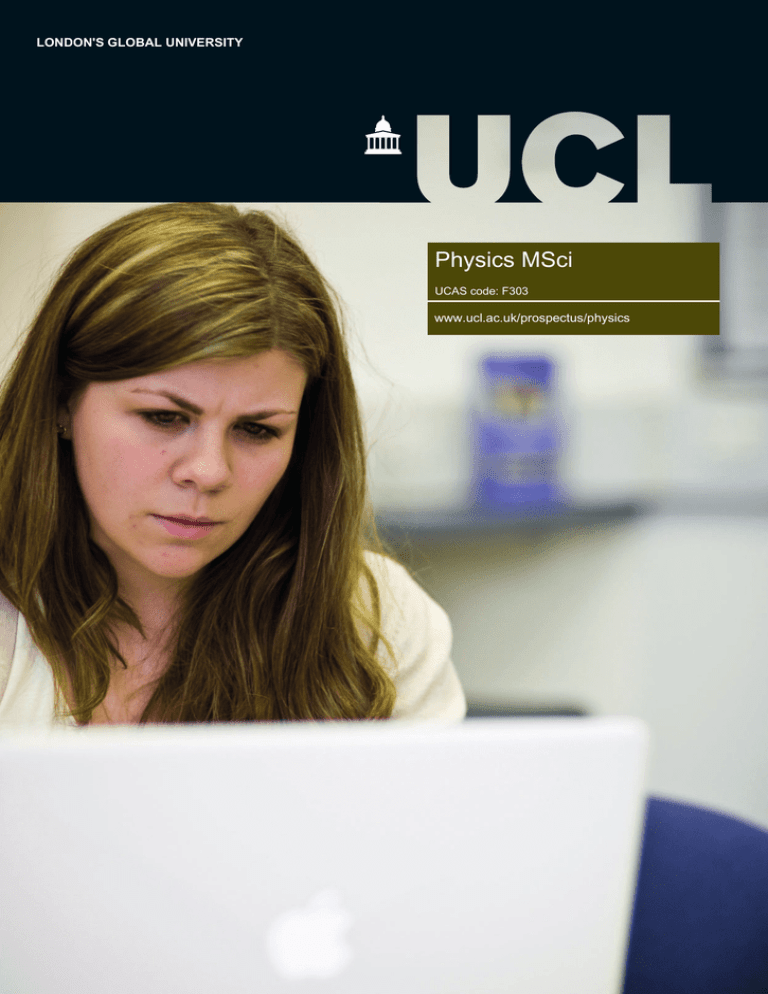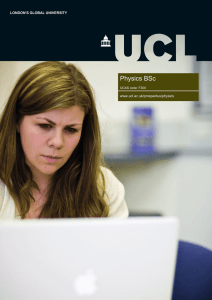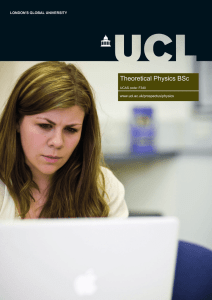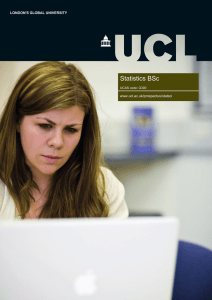Physics MSci LONDON'S GLOBAL UNIVERSITY www.ucl.ac.uk/prospectus/physics UCAS code: F303
advertisement

LONDON'S GLOBAL UNIVERSITY Physics MSci UCAS code: F303 www.ucl.ac.uk/prospectus/physics Physics MSci This four-year programme offers an additional year of study on top of the Physics BSc, during which students have the opportunity to specialise further by taking advanced optional courses, and undertaking a research project. Degree summary • A science degree from UCL is a strong asset across the whole range of careers where basic scientific skills are required, from accountancy to astrophysics, and computing to cryogenics. • The programme is accredited by the Institute of Physics (IOP) and includes the very latest developments and discoveries in the field, based on our highly rated research. Your learning • Collaborative links with both industry and international research laboratories provide insight into the practical application of your studies. Teaching is undertaken through lectures, laboratory (and as appropriate, observatory) practical sessions, and supervised problem-solving tutorials. These tutorials are designed to deal with lecture-based questions, enlarge on topics addressed in lectures, and allow clarification and in-depth discussion of new concepts. • A wide range of optional courses are available, including courses from other University of London colleges, which allows for individual preferences and specialisations within your degree. Assessment will normally involve end-of-year examinations, and an element of assessed coursework. For practical work you will be continuously assessed. Core courses in the first year provide a firm foundation in quantum and classical physics, underpinned by mathematics and a practical skills course which includes computing skills training. The second year includes core courses in quantum physics and its application to atoms and molecules, in statistical thermodynamics and in electromagnetic theory, along with further mathematics. The quantum and condensed matter elements of the core are completed in the third year. The second and third year also include practical laboratory and project courses, and optional courses to develop further and enhance knowledge of a range of physics topics. The fourth year comprises a compulsory research project, and a further five half-credit courses, generally chosen from subjects in the relevant degree specialty. A wide range of courses is available, including some taught by staff from other University of London colleges. This programme is offered both as a three-year BSc and a four-year MSci, with common structures and subjects for the first two years. However, the additional fourth year of the MSci programme allows for a greater depth of study and we recommend you apply for an MSci initially, as this keeps more options open. Your career Your scientific training will equip you with an understanding of mathematics, and of physical principles and techniques, as well as transferable skills in analysis, rational argument and innovative problem solving. Surveys by the IOP indicate that physicists' versatility is welcomed by a wider range of professions than any other subject. Around half our graduates choose to pursue further study for an MSc or PhD. A PhD opens up the possibility of an academic or research career in a university or research institute. Alternatively, like many of our graduates, you may consider employment in research, design, development, computing, finance, marketing and teaching, among others. First career destinations of recent graduates (2011-2013) of this programme include: • • • Risk Analyst, UBS • • Technical Consultant, BAE Systems Full-time student, PhD in High Energy Physics at UCL Full-time student, PhD in Applied Mathematics and Theoretical Physics at the University of Cambridge Full-time student, PGCE Science (Physics) at Institute of Education Degree structure In each year of your degree you will take a number of individual courses, normally valued at 0.5 or 1.0 credits, adding up to a total of 4.0 credits for the year. Courses are assessed in the academic year in which they are taken. The balance of compulsory and optional courses varies from programme to programme and year to year. A 1.0 credit is considered equivalent to 15 credits in the European Credit Transfer System (ECTS). Year Three Compulsory courses Electromagnetic Theory Experimental Physics Group Project Nuclear and Particle Physics Quantum Mechanics Solid State Physics Year One Optional courses Compulsory courses You will select your remaining 1.0 credit from a wide range of Physics options. Options may include: Classical Mechanics Mathematical Methods I Mathematical Methods II Physics of the Universe Practical Skills 1C Practical Skills 1P Thermal Physics Waves, Optics and Acoustics Optional courses All first year courses are compulsory. Energy and Climate Lasers and Modern Optics Materials and Nanomaterials Physical Cosmology Physics of Oceans, Ice Sheets and Climate (1.0 credits) Physics of the Earth Scientific Computing Using Object Oriented Languages Theory of Dynamical Systems Final Year Compulsory course Year Two Compulsory courses Atomic and Molecular Physics Electricity and Magnetism Mathematical Methods III Practical Physics 2A Practical Physics 2B Quantum Physics Statistical Thermodynamics Optional courses One optional course from the following: Environmental Physics Mathematics for Physics and Astronomy Physics of the Solar System Physics Project Optional courses You will select 2.5 credits from a wide range of optional courses. Entry requirements A levels A level grades AAA A level subjects Mathematics and Physics required. AS levels For UK-based students a pass in a further subject at AS level or equivalent is required. GCSE English Language and Mathematics at grade C. For UK-based students, a grade C or equivalent in a foreign language (other than Ancient Greek, Biblical Hebrew or Latin) is required. UCL provides opportunities to meet the foreign language requirement following enrolment, further details at: www.ucl.ac.uk/ug-reqs If you are based in the UK within a reasonable travelling distance of UCL, and your application demonstrates your suitability for the programme, you will be invited to a compulsory applicant open day. This will include presentations, a tour of facilities and an opportunity to meet current students and staff members. Fees UK/EU fee £9,000 (2016/17) Overseas fee £22,380 (2016/17) Notes Details about financial support are available at: www.ucl.ac.uk/study/ug-finance Contacts Contact Mrs Joanna Davies Admissions Co-ordinator IB diploma IB points 38 Email undergraduate-admissions@ucl.ac.uk Subjects A total of 18 points in three higher level subjects including Mathematics and Physics at grade 6, with no score below 5. Telephone +44 (0)20 7679 7246 Prospectus entry www.ucl.ac.uk/prospectus/physics Other qualifications Full lists of all degree programmes and other entry requirements can be found on our website at: www.ucl.ac.uk/otherquals Undergraduate Preparatory Certificates UCL's Undergraduate Preparatory Certificates (UPCs) are intensive one-year foundation courses for international students of high academic potential, who are aiming to gain access to undergraduate degree programmes at UCL and other top UK universities. For more information see our website: www.ucl.ac.uk/upc Your application Application for admission should be made through UCAS (the Universities and Colleges Admissions Service). Applicants currently at school or college will be provided with advice on the process; however, applicants who have left school or who are based outside the United Kingdom may obtain information directly from UCAS. In addition to the subjects and grades specified in the qualifying examinations, we are also looking for evidence of self-motivation and an enthusiastic interest in the subject. This may be demonstrated through paid or voluntary work experience, academic project work, or your interests and hobbies beyond the school curriculum. PDF Updated: February 19, 2016 Information correct at time of going to press. See website (www.ucl.ac.uk/prospectus/physics) for latest information Key facts REF 90% rated 4* (‘world-leading’) or 3* (‘internationally excellent’) Department Physics and Astronomy Faculty Mathematical & Physical Sciences









